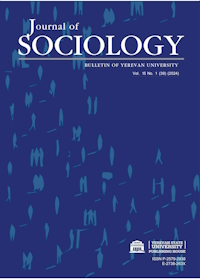SOCIO-PSYCHOLOGICAL ASPECTS OF WAR AND THEIR TRANSGENERATIONAL DIMENSION
DOI:
https://doi.org/10.46991/BYSU:F/2024.15.1.005Keywords:
trauma, transgenerational transmission, transgenerational dimension, war, horrorAbstract
This paper is about the psychological effect of war. By the welding of the explanatory potential of psychoanalysis and anthropology, it argues that victims of armed conflict, particularly if protracted, construct a melancholic response (Yordanova, 2018). Often, people on the move are met with hostility by the host countries or may find themselves in the social periphery. This fosters ambivalence towards the new environment as an expression of vulnerabilities. The paper suggests an intergenerational aspect to the above dynamic, too. Children, exposed to violence, lack the emotional and cognitive maturity to grasp what they have lived through. Yet, overwhelmed with their own feelings of loss, their parents fail to help them deal with the trauma. Thus, children identify with the parents’ complicated grief and the assumption of an idealized pre-war past versus scarce future opportunities. Finally, the paper examines the intersections between individual war trauma, cultural memory and power dynamics in post-conflict societies. Using my field work in Sarajevo (2012, 2018), I argue that war survivors avoid the construction of a consistent war narrative in the first person because they need the state-recognized version of history to be re-written (Yordanova, 2015). The ambiguity of their experience in war, the inadequacy of language to convey horror, and the clash of private memories with the official discourse drive them to alternative forms of expression. Survivors and their children use art, humour, tattoos, scarring, and landscape to explain the war and get connected to each other. In the post-war environment, the narrative of veterans who were most exposed to warfare becomes muted in order not to challenge the political status-quo.
References
Antze, P and Lambek, M (Eds.). (1996). Tense Past: Cultural Essays in Trauma and Memory. New York; London: Routledge 331
Atanesyan, A. V., Reynolds, B. M., & Mkrtichyan, A. E. (2023). Balancing between Russia and the West: the hard security choice of Armenia. European Security 33(2): 261-283. https://doi.org/10.1080/09662839.2023.2258528
Auerhahn, N C. and Laub, D. (1998). ‘The Primal Scene of Atrocity: The Dynamic Interplay Between Knowledge and Fantasy of the Holocaust in Children of Survivors’, Psychoanalytic Psychology 15: 360-377.
Barocas, H A. and Barocas, C B. (1979). ‘Wounds of the Fathers: The Next Generation of Holocaust Victims’, International Review of Psycho-Analysis 6: 331-340
Bion, W. R. (1961). Experiences in Groups, and Other Papers. London: Tavistock Publications 333
Bloch, M. (2005). Essays on Cultural Transmission. Oxford: Berg
Bos, P. R. (2003). ‘Positionality and Postmemory in Scholarship on the Holocaust’, Women in German Yearbook 19: 50-74
Bourke, J. (1999). An Intimate History of Killing: Face To Face Killing In Twentieth Century Warfare, Basic Books
Das, Veena. 2007. Life and Words: Violence and the Descent into the Ordinary. London: University of California Press
Faimberg, H. (1988). ‘The Telescoping of Generations: Genealogy of Certain Identifications’, Contemporary Psychoanalysis (24): 99-117.
Freud, S. (1917). ‘Mourning and Melancholia’. The Standard Edition of the Complete Psychological Works of Sigmund Freud (14): 237-258
Kestenberg, J. (1980). ‘Psychoanalyses of Children of Survivors from the Holocaust: Case Presentations and Assessment’, Journal of the American Psychoanalytic Association (28): 775-804
Klein, M. (1975) Love, Guilt and Reparation and Other Works (1921-45). London: Hogarth
Klein, M. (1940) ‘Mourning and Its Relation to Manic Depressive States’, The International Journal of Psycho-Analysis (21): 125-153
Klein, M. (1930) ‘The Importance of Symbol-Formation in the Development of the Ego’, The International Journal of Psycho-Analysis (11) :24-39.
Laub, D. and Auerhahn, N. (1989). ‘Failed Empathy—A Central Theme in the Survivor's Holocaust Experience’, Psychoanalytic Psychology (6): 377-400 344
Nordstrom, C and Martin, J. (Eds.). (1992). Paths to Domination, Resistance, and Terror. Oxford: University of California Press
Robben, A. C.G.M. (2007). Political Violence and Trauma in Argentina. University of Pennsylvania Press
Robben, A. C.G.M. 2005. ‘How Traumatized Societies Remember: The Aftermath of Argentina's Dirty War’, Cultural Critique (59): 120-164
Robben, A. C.G.M. and Su’arez-Orozco, M. 2000. Cultures under Siege: Collective Violence and Trauma. Cambridge: Cambridge University Press
Segal, H. (2007). Yesterday, Today and Tomorrow. Routledge
Sluka, J. (2012). ‘Drones in the Tribal Zone: Virtual War and Losing Hearts and Minds in the Af-Pak War’, in War, Technology, Anthropology, edited by Koen Stroeken, Berghahn Books
Volkan, V. D. (2001). ‘Transgenerational Transmissions and Chosen Traumas: An Aspect of Large-Group Identity’, Group Analysis (34): 79-97
Yordanova, K. (2018). ‘Melancholic Response to War Destruction and the Emergence of a Group Assumption of Post-ness’. American Journal of Psychoanalysis, 1-16
Yordanova, K. (2015). ‘Images of War: The Place of the War Past of the Parents in the Second Generation’s Identity’, Journal of Regional Security, 10 (1): 79-102
Yordanova, K. (2015). ‘Second Generation’s Imagery of the Bosnian war (1992-5)’, The Anthropology of East Europe Review, 33 (1): 70-86
Yordanova, K. (2012). ‘Transmission of Traumatic Experiences in the Families of War Survivors from Bosnia and Herzegovina’. Contemporary Issues 5(1): 52-60.
Downloads
Published
Issue
Section
License
Copyright (c) 2024 Kalina Yordanova

This work is licensed under a Creative Commons Attribution-NonCommercial 4.0 International License.





